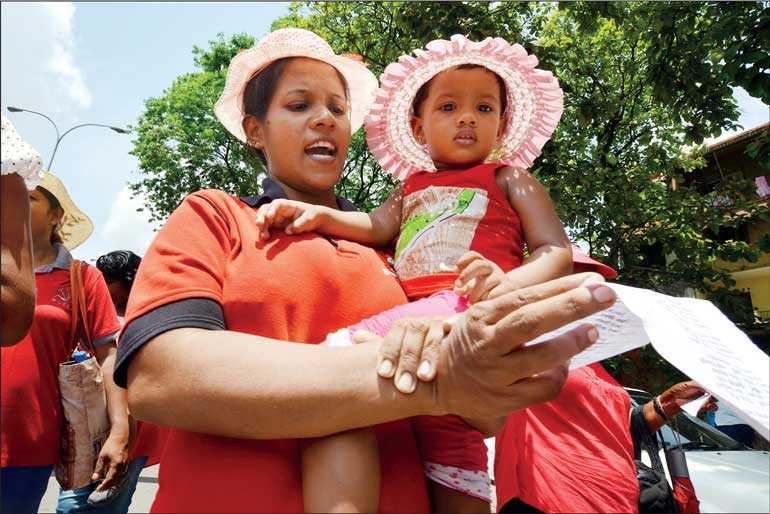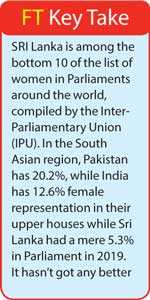Wednesday Feb 25, 2026
Wednesday Feb 25, 2026
Wednesday, 20 January 2021 00:00 - - {{hitsCtrl.values.hits}}

For Sri Lanka to come anywhere close to the global average of 25% female representation, political parties have to overcome their own psychological barriers and nominate more women candidates while creating an enabling environment to encourage them – Pic by Shehan Gunasekara
Why is it that Sri Lanka, despite boasting the world’s first woman Prime Minister and a woman President well before the more developed countries got there, still lags behind most of the world in the  proportion of women representatives in Parliament?
proportion of women representatives in Parliament?
Sri Lanka is among the bottom 10 of the list of women in Parliaments around the world, compiled by the Inter-Parliamentary Union (IPU). In the South Asian region, Pakistan has 20.2%, while India has 12.6% female representation in their upper houses while Sri Lanka had a mere 5.3% in Parliament in 2019. It hasn’t got any better by 2021.
Multiple benefits
A policy brief prepared by the UN Economic and Social Commission for Asia and the Pacific (ESCAP) suggests that more women in political leadership results in “several societal benefits, such as inequality reduction, increased cooperation across party and ethnic lines…increased prioritisation of social issues, like health, education, parental leave, and pensions.” These are very good reasons to increase the number of women in Parliament.
That apart, in Sri Lanka, women represent 52% of the population and it seems ludicrous that nearly 95% of those who legislate for the country are men.
If a country were to encourage more women to participate in politics, studies have shown that there will be significant pay-offs. The ESCAP brief quotes from a study which shows that “women’s political participation has been shown to be particularly influential to women in their communities. Factors such as female voter turnout, female political participation, and public service responsiveness towards women have a positive relationship with the presence of women in decision-making positions across the public and private sectors”.
In what is called the “Role Model Effect” they also found that more women in Parliament normalises for all genders, “the idea and practice of women holding power”. A further study conducted in India concluded that the “increased proportion of women village leaders had closed the ‘aspiration gap’ between girls and boys by nearly 25 percentage points.”
Multiple barriers
There are many barriers to women’s participation in politics. A 2018 ILO report quoted in the ESCAP brief states that “Women spend up to four times as much time on unpaid care work than men in the region, precluding them from economic and political participation.” Based on other such research, the report unequivocally concludes that “Unpaid care work is one of the primary reasons that women cannot enter politics”. There are other reasons including social norms, harassment, actual and psychological violence, intolerance and stereotyping.
An Inter Parliamentary Union study conducted in 2016 on women parliamentarians in 39 countries found that “82% of the interviewees have experienced psychological violence, remarks, gestures and images of a sexist or humiliating nature, or threats and mobbing”. In the Sri Lankan Parliament, violence is not uncommon but seems to be gender-neutral in its practice.
It doesn’t help that women themselves have been socialised into thinking that men make better leaders, in addition to the usual male prejudice about women. According to the ESCAP Brief, “On average, over 50% of the respondents from the region ‘agree’ and ‘agree strongly’ that ‘men make better political leaders than women do’. (World Values Survey, 2014).” 
A 2018 study (‘Prejudice against women in power is greater than we think,’ ScienceDaily) concluded that “Given that even many women have reservations against women leaders, the societal and political promotion of gender equity has obviously not been successful at changing the attitudes of every potential future leader.”
Sanitary prejudice
Women parliamentarians sometimes find it difficult to transcend gender-oriented prejudice even in their own minds, despite the fact that they have themselves defied gender stereotypes and gained valuable opportunities to speak for other women in the legislature.
During a debate on the free provision of sanitary towels to school girls, while some Opposition women parliamentarians spoke of the poverty that forced many girls to miss schools during menstruation, urging that free sanitary towels should be urgently provided, some women parliamentarians on the Government side objected to the very notion that such subjects should be discussed in Parliament, insisting that such provision should be a matter for others such as family.
Despite objections of the women on their own side, the Government in a commendably progressive move seems to have decided to act on the proposal of the Leader of the Opposition to provide free sanitary towels to school girls.
Enabling environment
The Parliament itself is not properly equipped to encourage women parliamentarians. Some months ago, a breast-feeding woman parliamentarian revealed that there was no proper place for women to attend to such basic needs. How different could this situation be, if in Sri Lanka’s long parliamentary history, there had been at least one female Speaker of the House?
Madam Speaker
The Inter Parliamentary Union reported in October 2020 that there were 52 women who presided over one of the houses of the 192 parliaments. Since 79 are bicameral, only 20.1% of the presiding officers of the 288 posts of presiding officers of Parliaments are women. In and around our region, several of our neighbours have appointed women as Speakers: Pakistan (2008), India (2009), Singapore (2013), Bangladesh (2013), Nepal (2015), Philippines (2018), Indonesia (2019).
Among the most distinguished women Speakers in the world is one that is the longest-serving, Nancy Pelosi of the United States Senate who was repeatedly elected to the post. Another, Betty Boothroyd of the UK House of Commons, was the only woman to have served in that role.
Having a woman Speaker of the House also has a role model effect on women. After the 2018 elections in Fiji, its female representation in Parliament stood at 20%. This is attributed in the ESCAP brief to the role of the first female Speaker appointed in 2014.
Smear campaigns
At the Beijing+25 conference, a country report for the Asia Pacific Region says that “Double standards, blackmailing and smear campaigns in the media are actively used against women politicians…” Sri Lankans are familiar with this phenomenon, but here it extends also to the wives of political leaders, some of whom have faced its most virulent expression.
ESCAP studies have shown that “women have to combat the norms regarding care work, and also norms regarding desirable traits in women candidates”. “Desirable traits” also extend to wives of political leaders in Sri Lanka who are often criticised for not adhering to the dictum of “being seen, and not heard”.
Setting new norms
Courageously resisting the prevailing gender norms, Eleanor Roosevelt, wife of the iconic President of the United States, Franklin D. Roosevelt, was a vociferous campaigner for women’s rights as well as civil rights of African Americans during her husband’s term from 1933-1945. She played a principal role in the drafting of the Universal Declaration of Human Rights.
More recently, Michelle Obama, spouse of President Barack Obama, campaigned effectively for poverty awareness and to end Childhood obesity through healthier meals and exercise, leading a public health campaign called “Let’s Move!”
These First Ladies used their proximity to power and access to the media for the greater good of their citizens. It is not often remembered that Hema Premadasa, mercilessly criticised, moved to install signboards for reserved seating for pregnant women in buses and to extend their maternity leave. She also drove the initiative, as the chairperson of Seva Vanitha, to introduce the Women’s Charter (1993) during her husband’s presidency.
Women often have a lot more to offer than backward social norms limit them to. The attempts to keep those norms entrenched by public humiliation of women will impede the positive contribution women can make to society, if not resisted and followed up by setting new norms through example. This calls for courageous women as well as an equally courageous supportive community of the enlightened.
Recommendations
ESCAP recommends several steps to encourage more women in politics:
For Sri Lanka to come anywhere close to the global average of 25% female representation, political parties have to overcome their own psychological barriers and nominate more women candidates while creating an enabling environment to encourage them. Current preoccupations of some political parties in Sri Lanka with other longstanding and divisive prejudices may indicate that the issue of female representation will have to stand in line for some time. They may want to hurry it along a bit though, to catch the global trend, with Kamala Harris who will be the first female US Vice President from this week, pointedly wearing socks that declare that ‘The Future is Female!’